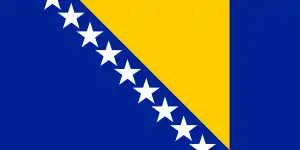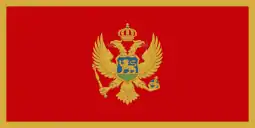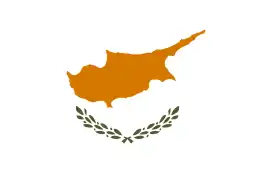FK Rad
Fudbalski klub Rad (Serbian Cyrillic: Фудбалски клуб Рад) is a Serbian professional football club based in Belgrade, that competes in the Serbian SuperLiga. The club's name translates as "work" or "labour" due to being formed by the construction company of the same name in 1958.
| Full name | Fudbalski klub Rad | ||
|---|---|---|---|
| Nickname(s) | Građevinari (The Builders) | ||
| Founded | 10 March 1958 | ||
| Ground | King Peter I Stadium | ||
| Capacity | 3,919 | ||
| Head coach | vacant | ||
| League | Serbian SuperLiga | ||
| 2019–20 | Serbian SuperLiga, 15th | ||
| Website | Club website | ||
|
| |||
Rad does not have a large supporter base but it is known for a very loyal supporter base, they compete regularly in the top tier of Serbian club football. There have been some very famous successful footballers to have played for Rad, such as: Miroslav Đukić, Ljubinko Drulović, Vladimir Jugović, Miroslav Stević, Zoran Mirković, and more recently Luka Milivojević.
The club has somewhat of a negative reputation caused mainly by its supporters who are known as "United Force", they can often be compared to the Millwall FC of Serbian football. On a positive note "United Force" are known as one of the most loyal supporter groups in Serbia following the club in good numbers home or away.
History
Rad was founded in 1958 by workers of the GRO Rad company. From the start the club had two major local rivals: Banjica and Jajinci, these rivalries were the rivals of the company but quickly it passed to football. The following individuals are considered as club's founders: Petar Đerasimović, the first president, Radojica Tanasijević, the first general selector, Željko Marjanović, the first financial adviser, and Ljubomir Lazić, the first vice president. The players that have played in 1958 can feel like founders as well, Rad had a lot of young players that were schooled in the First league teams, some players would include: Lazar Slavković, Đurđe Ivković, Vladimir Acević, Teodor Šušnjar, Milan Abramović, Brana Djaković, Aleksandar Banić, Živojin Rafailović, Aleksandar Andrejić, and a little later Sreten "Sele" Antić, Milan "Selja" Jovanović, and others.
The first head coach was Nikola Marjanović. The parliament has given the club a pitch in the center of Banjica, a few concrete stands were made, and later locker rooms were added, as well as the restaurant. The club had supporters in the Banjica region, which followed their club away and home. Rad quickly got promoted to the Belgrade League. In the period from 1965 to 1969, a change of generations had taken place. At that time the leaders were Ljubomir Lazić and Radomir Antić, notable managers were Đorđević and Đurđević, leaders for the players were Ratomir Janković, Vlada Vlaović, Matović, Zoran Bulatović, Dutina, Čeh and others.
The club's greatest success occurred in 1988–89 season when it finished the Yugoslav First League competition in fourth spot, ahead of many richer clubs such as Partizan. This success qualified Rad for the UEFA Cup in the 1989–90 season, where it was eliminated 2–3 on aggregate in the first round by Olympiacos (Rad lost 0–2 in Athens after winning 2–1 on home ground).
In 2011, Rad competed in the Europa League the club's second appearance in European competition and again the opponent was from Greece this time Olympiakos Volou. The first game played in Belgrade at the home ground of FK Obilić finished in a 0–1 loss for Rad, the second leg in Greece finished 1–1 with Nemanja Kojić scoring for Rad, which meant Rad where eliminated from the Europa League at the first hurdle, Rad's most successful manager who helped guide the club into European football Marko Nikolić would later go on to manage successfully across Europe especially in Hungary with Fehérvár FC and in Russia with FC Lokomotiv Moscow[1]
In February 2017, a section of Rad supporters were accused of shouting racist abuse during a match against FK Partizan that reduced opposition player Everton Luiz to tears and resulted in confrontation between the opposing sides at the end of the match.[2] There are examples of Rad supporters been accepting and supportive of minority players, such as when Predrag Luka a Romani people born Serb, played successfully for the club over a period of years and became a fan favourite.[3]
Name changes through history
- 1958: club founded under the name of FK Rad
- 1990: renamed to FK GRO Rad
- 1993: renamed again to FK Rad
Stadium
The stadium of Rad is the King Petar I Stadium, commonly known as "Stadion na Banjici" (Stadium at Banjica), which is located in the southern part of Belgrad's Banjica neighbourhood, and holds about 3,919 people. It was built in 1977, although its stand dates back to the pre-World War II period when it was used for military parades and other state celebrations during the Kingdom of Yugoslavia.[4]
Supporters and Rivalries
Rad's supporters group was founded in 1987 under the name United Force, a relatively small but strong and well organized group. They have a historic association with football hooliganism. Their main rivalry is with OFK Beograd, the rivalry is known as "the small Belgrade derby"[5]
They profess far-right ultra-nationalist views, making them very unpopular with Bosniak Muslim nationalist fans of Novi Pazar who express their own far right views at most games, although in a footballing sense this has not really been a rivalry as the clubs through their history have hardly played in the same league/division.[6] They also have a local rivalry with the Crvena Zvezda, Partizan, OFK Beograd-Voždovac alliance with whom they contest Belgrade derbies.
Rad in European competitions
| Season | Competition | Round | Country | Club | Home | Away | Aggregate |
|---|---|---|---|---|---|---|---|
| 1989–90 | UEFA Cup | R1 | Olympiacos | 2–1 | 0–2 | 2–3 | |
| 2011–12 | Europa League | QR1 | Tre Penne | 6–0 | 3–1 | 9–1 | |
| QR2 | Olympiacos Volos | 0–1 | 1–1 | 1–2 | |||
Current squad
First team
- As of 15 October 2020[7]
Note: Flags indicate national team as defined under FIFA eligibility rules. Players may hold more than one non-FIFA nationality.
|
|
Players with multiple nationalities

 Milan Lazarević
Milan Lazarević
 Mihailo Milutinović
Mihailo Milutinović
 Miloš Tanović
Miloš Tanović
For recent transfers, see List of Serbian football transfers summer 2020.
Technical staff
 Dragan Radojičić – Head Coach
Dragan Radojičić – Head Coach Dragoslav Milenković – Assistant Coach
Dragoslav Milenković – Assistant Coach Slađan Nikolić – Trainer
Slađan Nikolić – Trainer Vladan Radača – Goalkeeper Coach
Vladan Radača – Goalkeeper Coach Vladimir Procikijević – Physical Coach
Vladimir Procikijević – Physical Coach Zdravko Marinković – Recovery Coach
Zdravko Marinković – Recovery Coach Zoran Rakić – Recovery Coach
Zoran Rakić – Recovery Coach
Notable players
The club official website considers Duško Ajder and Dragan Kokotović as club's two major legends. Beside them, important players in different historical periods are considered Miodrag Vranješ, Ratomir Janković and Lazar Slavković.[8]
Former players with senior national team appearances:[9]
 Miloš Bogunović
Miloš Bogunović Filip Đorđević
Filip Đorđević Igor Đurić
Igor Đurić Brana Ilić
Brana Ilić Bojan Jorgačević
Bojan Jorgačević Aleksandar Jovanović
Aleksandar Jovanović Branislav Jovanović
Branislav Jovanović Damir Kahriman
Damir Kahriman Andrija Kaluđerović
Andrija Kaluđerović Filip Kljajić
Filip Kljajić Nikola Maraš
Nikola Maraš Luka Milivojević
Luka Milivojević Bogdan Mladenović
Bogdan Mladenović Ognjen Ožegović
Ognjen Ožegović Andrija Pavlović
Andrija Pavlović Nemanja Pejčinović
Nemanja Pejčinović Miloš Stanojević
Miloš Stanojević Nikola Stojiljković
Nikola Stojiljković Nenad Tomović
Nenad Tomović Slobodan Urošević
Slobodan Urošević Jagoš Vuković
Jagoš Vuković%253B_Flag_of_Serbia_and_Montenegro_(2003%E2%80%932006).svg.png.webp) Goran Bunjevčević
Goran Bunjevčević%253B_Flag_of_Serbia_and_Montenegro_(2003%E2%80%932006).svg.png.webp) Željko Cicović
Željko Cicović%253B_Flag_of_Serbia_and_Montenegro_(2003%E2%80%932006).svg.png.webp) Jovan Damjanović
Jovan Damjanović%253B_Flag_of_Serbia_and_Montenegro_(2003%E2%80%932006).svg.png.webp) Petar Divić
Petar Divić%253B_Flag_of_Serbia_and_Montenegro_(2003%E2%80%932006).svg.png.webp) Boban Dmitrović
Boban Dmitrović%253B_Flag_of_Serbia_and_Montenegro_(2003%E2%80%932006).svg.png.webp) Ljubinko Drulović
Ljubinko Drulović%253B_Flag_of_Serbia_and_Montenegro_(2003%E2%80%932006).svg.png.webp) Nenad Grozdić
Nenad Grozdić%253B_Flag_of_Serbia_and_Montenegro_(2003%E2%80%932006).svg.png.webp) Spira Grujić
Spira Grujić%253B_Flag_of_Serbia_and_Montenegro_(2003%E2%80%932006).svg.png.webp) Bojan Isailović
Bojan Isailović%253B_Flag_of_Serbia_and_Montenegro_(2003%E2%80%932006).svg.png.webp) Đorđe Jokić
Đorđe Jokić%253B_Flag_of_Serbia_and_Montenegro_(2003%E2%80%932006).svg.png.webp) Zoran Mirković
Zoran Mirković%253B_Flag_of_Serbia_and_Montenegro_(2003%E2%80%932006).svg.png.webp) Pavle Ninkov
Pavle Ninkov%253B_Flag_of_Serbia_and_Montenegro_(2003%E2%80%932006).svg.png.webp) Predrag Ocokoljić
Predrag Ocokoljić%253B_Flag_of_Serbia_and_Montenegro_(2003%E2%80%932006).svg.png.webp) Aleksandar Pantić
Aleksandar Pantić%253B_Flag_of_Serbia_and_Montenegro_(2003%E2%80%932006).svg.png.webp) Marko Perović
Marko Perović%253B_Flag_of_Serbia_and_Montenegro_(2003%E2%80%932006).svg.png.webp) Dejan Rađenović
Dejan Rađenović%253B_Flag_of_Serbia_and_Montenegro_(2003%E2%80%932006).svg.png.webp) Vuk Rašović
Vuk Rašović%253B_Flag_of_Serbia_and_Montenegro_(2003%E2%80%932006).svg.png.webp) Predrag Ristović
Predrag Ristović%253B_Flag_of_Serbia_and_Montenegro_(2003%E2%80%932006).svg.png.webp) Borislav Stevanović
Borislav Stevanović%253B_Flag_of_Serbia_and_Montenegro_(2003%E2%80%932006).svg.png.webp) Miroslav Stević
Miroslav Stević%253B_Flag_of_Serbia_and_Montenegro_(2003%E2%80%932006).svg.png.webp) Dragan Vukmir
Dragan Vukmir%253B_Flag_of_Serbia_and_Montenegro_(2003%E2%80%932006).svg.png.webp) Aleksandar Živković
Aleksandar Živković.svg.png.webp) Miroslav Đukić
Miroslav Đukić.svg.png.webp) Jusuf Hatunić
Jusuf Hatunić.svg.png.webp) Vladimir Jugović
Vladimir Jugović.svg.png.webp) Mihajlo Petrović
Mihajlo Petrović.svg.png.webp) Vladan Radača
Vladan Radača.svg.png.webp) Vlada Stošić
Vlada Stošić.svg.png.webp) Ilija Zavišić
Ilija Zavišić Aleksandar Bratić
Aleksandar Bratić Petar Jelić
Petar Jelić Aleksandar Kosorić
Aleksandar Kosorić Nenad Mišković
Nenad Mišković Duško Sakan
Duško Sakan.svg.png.webp) Milan Borjan
Milan Borjan.svg.png.webp) Stefan Cebara
Stefan Cebara Li Chunyu
Li Chunyu Ivan Cvjetković
Ivan Cvjetković Siniša Gogić
Siniša Gogić Dejvi Glavevski
Dejvi Glavevski Aleksandar Lazevski
Aleksandar Lazevski Dančo Masev
Dančo Masev Perica Stančeski
Perica Stančeski Goran Stanić
Goran Stanić Aleksandar Todorovski
Aleksandar Todorovski Branko Bošković
Branko Bošković Nenad Brnović
Nenad Brnović Nikola Drinčić
Nikola Drinčić Vladimir Gluščević
Vladimir Gluščević Mitar Novaković
Mitar Novaković Vladimir Rodić
Vladimir Rodić Vladimir Volkov
Vladimir Volkov Nikola Vujnović
Nikola Vujnović
For the list of all current and former players with Wikipedia article, please see: Category:FK Rad players.
Managers
The club's current manager is Marko Mićović, who was appointed in December 2019.[10]
Kit manufacturers
| Period | Kit Manufacturer | Shirt Sponsor |
|---|---|---|
| 2010–2012 | Patrick | None |
| 2012–2013 | Joma | |
| 2014–present | NAAI | Rubikon |
References
- http://www.skysports.com/football/rad-vs-olympiacos-volou/245042
- "Racist Serb fans torment Brazilian footballer Everton Luiz". BBC News. 20 February 2017. Retrieved 21 February 2017.
- "Životni put Predraga Luke". telegraf.rs/sport/fudbal/3179110-predrag-luka-intervju-zivotni-put-romsko-naselje-mladi-radnik-pozarevac-fk-partizan-rad-banjica-skinhedsi-navijaci-vodja-united-force (in Serbian). 3 July 2020. Retrieved 31 July 2020.
- FK Rad at srpskistadioni.in.rs
- http://www.ultras-tifo.net/photo-news/3236-rad-belgrade-OFK Beograd-21-02-2015.html
- http://www.ultras-tifo.net/photo-news/3236-rad-belgrade-novi-pazar-21-02-2015.html
- "2020/21 Rad" (in Serbian). Serbian SuperLiga. Retrieved 22 August 2020.
- Club legends Archived 30 September 2013[Date mismatch] at the Wayback Machine at FK Rad official website. Retrieved 18 September 2013 (in Serbian)
- Rad Beograd at National-Football-Teams.com
- "Dragan Radojičić novi trener Rada". Večernje novosti (in Serbian). 23 August 2019. Retrieved 9 September 2019.
External links
- Official website (in Serbian)
- United Force website
- Club page at Utakmica
- Club page at Srbijafudbal
